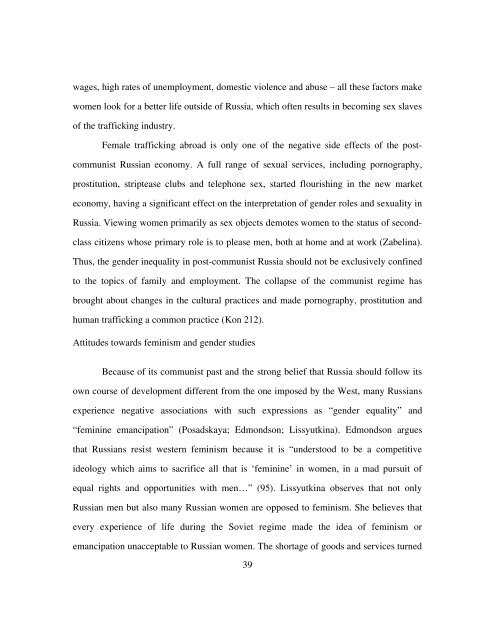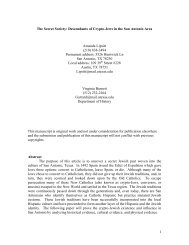Copyright by Tatiana Borisovna Segura 2008 - The University of ...
Copyright by Tatiana Borisovna Segura 2008 - The University of ...
Copyright by Tatiana Borisovna Segura 2008 - The University of ...
You also want an ePaper? Increase the reach of your titles
YUMPU automatically turns print PDFs into web optimized ePapers that Google loves.
wages, high rates <strong>of</strong> unemployment, domestic violence and abuse – all these factors make<br />
women look for a better life outside <strong>of</strong> Russia, which <strong>of</strong>ten results in becoming sex slaves<br />
<strong>of</strong> the trafficking industry.<br />
Female trafficking abroad is only one <strong>of</strong> the negative side effects <strong>of</strong> the post-<br />
communist Russian economy. A full range <strong>of</strong> sexual services, including pornography,<br />
prostitution, striptease clubs and telephone sex, started flourishing in the new market<br />
economy, having a significant effect on the interpretation <strong>of</strong> gender roles and sexuality in<br />
Russia. Viewing women primarily as sex objects demotes women to the status <strong>of</strong> second-<br />
class citizens whose primary role is to please men, both at home and at work (Zabelina).<br />
Thus, the gender inequality in post-communist Russia should not be exclusively confined<br />
to the topics <strong>of</strong> family and employment. <strong>The</strong> collapse <strong>of</strong> the communist regime has<br />
brought about changes in the cultural practices and made pornography, prostitution and<br />
human trafficking a common practice (Kon 212).<br />
Attitudes towards feminism and gender studies<br />
Because <strong>of</strong> its communist past and the strong belief that Russia should follow its<br />
own course <strong>of</strong> development different from the one imposed <strong>by</strong> the West, many Russians<br />
experience negative associations with such expressions as “gender equality” and<br />
“feminine emancipation” (Posadskaya; Edmondson; Lissyutkina). Edmondson argues<br />
that Russians resist western feminism because it is “understood to be a competitive<br />
ideology which aims to sacrifice all that is ‘feminine’ in women, in a mad pursuit <strong>of</strong><br />
equal rights and opportunities with men…” (95). Lissyutkina observes that not only<br />
Russian men but also many Russian women are opposed to feminism. She believes that<br />
every experience <strong>of</strong> life during the Soviet regime made the idea <strong>of</strong> feminism or<br />
emancipation unacceptable to Russian women. <strong>The</strong> shortage <strong>of</strong> goods and services turned<br />
39

















